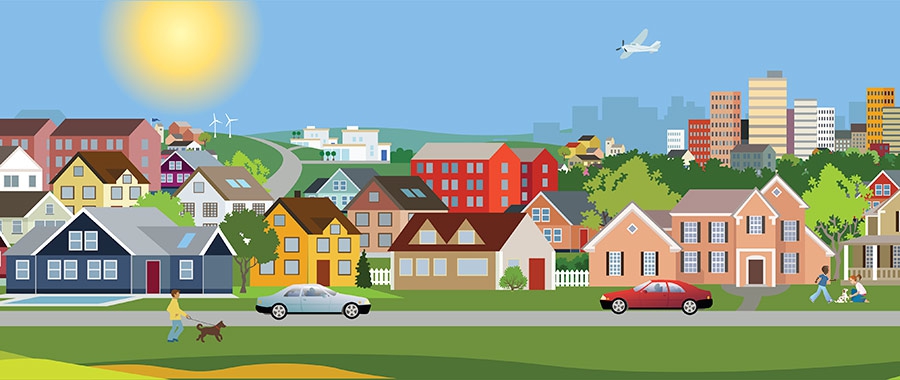The views expressed in our content reflect individual perspectives and do not represent the authoritative views of the Baha'i Faith.
The Baha’i approach to social transformation differs from most contemporary approaches, focusing less on material resources and more on the core of social change—the people.
This translates into a process of community building, which means strengthening both the spiritual and material nature of the community through a grassroots approach. This means that capacity is gradually developed in the community, until it can branch out and influence nearby communities, with growing degrees of complexity.
In a time when the political, social and economic structures of society are disintegrating, leaving hatred and despair in their wake, the careful construction of a global foundation of spiritual values that can penetrate every aspect of society ensures a hopeful future for communities around the world—communities that can withstand, and eventually transcend, the negative effects of a crumbling society:
Be not concerned with the smallness of your numbers, neither be oppressed by the multitude of an unbelieving world. Five grains of wheat will be endued with heavenly blessing, whereas a thousand tons of tares will yield no results or effect. One fruitful tree will be conducive to the life of society … – Abdu’l-Baha, Tablets of the Divine Plan, p. 95.
This foundation, rooted in the Baha’i teachings, is built through the long-term commitment of groups of people in every part of the world discovering what it takes to make a society fruitful, both materially and spiritually.
These are some of the activities—sometimes called “core activities”—that Baha’i communities carry out across the globe to further unity and social transformation:
Study Circles
Every person, no matter their social class, level of education, family background or race, has the ability to contribute to society. But sadly, the world has few spaces where people from all walks of life can come together to talk about spiritual topics, educate themselves on community-building strategies, and become friends with a shared purpose. The Ruhi Institute, a Baha’i-inspired organization, developed a series of courses to respond to this pressing need.
Through the books prepared by the Ruhi Institute, friends anywhere can gather in “study circles”—a name that reflects the egalitarian nature of the group, as opposed to a classroom dynamic—led by a friend with previous training in the book being studied. These books prompt people to study the Baha’i writings and ask questions that begin deep discussions, allowing participants to discover how the Baha’i teachings can be applied to their lives and the life of their community.
These study circles have no pre-requisite—in fact, in some places where language and level of education are a barrier, friends use a combination of audiobooks and alphabetization courses to ensure that everyone is on the same footing. They also take place anywhere; from college campuses to family homes, from neighborhoods to corporate settings.
Through theoretical and practical components, members of a study circle develop a shared vision and learn strategies designed to improve the spiritual and material conditions around them.
Children’s Classes
We often talk about how children are the future of the world. But while movements for the education of children are being strengthened everywhere, little attention is paid to their spiritual education. Just like adults, children have the capacity to understand spiritual teachings, and at a young age they are able to apply those teachings to their lives much more effectively. However, a commitment on the part of the community is needed to create a space for children to receive spiritual education—equally as important as the material education they receive at school.
In Baha’i neighborhood children’s classes—through art, songs, stories, prayer and memorization—children throughout the world learn to identify spiritual virtues such as truthfulness, kindness, forgiveness and unity. These virtues, common to every religious and moral teaching, help children navigate their worlds and form their adult lives. The profound effect these concepts have on children is evident: their capacity to communicate their feelings is improved, their belief in their own capacity is heightened, and their ability to distinguish good and bad is strengthened.
Baha’is believe that we are all like mines full of gems, which only education can reveal:
Regard man as a mine rich in gems of inestimable value. Education can, alone, cause it to reveal its treasures, and enable mankind to benefit therefrom. – Baha’u’llah, Gleanings from the Writings of Baha’u’llah, p. 259.
Giving children a chance to strengthen themselves spiritually prepares them for a challenging world in which they will have an extremely important role as the future members of society.
Junior Youth Groups
Crucial to the destiny of any community is its youth, especially those between the ages of 12 and 15—the ages Baha’is call “junior youth.” Those developing adolescents, no matter where they come from or what their living situation is, are at an important point of transition from childhood to adulthood, which both bursts with potential and makes them particularly vulnerable to the negative influences of materialism, fear and prejudice.
In response to this, the Baha’i community has developed the Junior Youth Spiritual Empowerment Program, which aims to help junior youth harness their potential and use their energies for the benefit of the world around them.
An “animator”—often a youth some years older than the group of junior youth—guides the group through a program that encourages them to think critically and to see themselves as agents of change in their communities. Through study, they learn to identify the influences that surround them while developing their spiritual strengths. Through acts of service—which can be anything from cleaning litter on a nearby street to systematically organizing classes for younger children—junior youth become empowered to make decisions that benefit them and the community around them, not only materially, but also spiritually.
Currently, over 150,000 junior youth are engaged in 17,000 groups throughout the world, with numbers steadily rising as more people witness the transformative power of the program and how it can benefit their communities.
Devotional gatherings
It’s only natural that in a community where conversations about spirituality regularly take place, devotional gatherings should spring up as a communal activity, becoming a center around which friends and neighbors gather to pray together.
While individual prayer connects every person with the Creator, sharing prayers in a group setting strengthens unity, encourages more profound conversation, and establishes a space for everyone—adults, youth, and even children—where spirituality becomes the main priority, where the soul is prioritized.
These informal devotionals can take different shapes. In some rural villages, neighbors will gather at the break of dawn to pray together before taking to the fields. In large cities, families living in the same building will meet in the evenings after work to pray. Sometimes stories are shared, and sometimes music plays a large role in enhancing the spiritual nature of the gathering. Depending on the customs and interests of each community, the devotional can change, but its purpose remains the same: to unite the souls of all those present through the power of prayer.
Isn’t This the Purpose of Religion?
The Baha’i writings speak of the twofold moral purpose that every person has in their life: to better themselves, and to better the society around them. It isn’t enough to be a good person if we allow the negative forces of the world to continue wreaking havoc around us. It isn’t enough to actively work to better society if in our personal lives we continue to practice harmful behaviors. A truly spiritual life does both simultaneously, one aspect building upon the other.
The efforts carried out by the Baha’i Faith, the Universal House of Justice says, are continuously growing, with our new understanding of our role in the world evolving, and manifesting itself in the following ways:
… in the awareness of a global community that, in all its endeavours, it is hastening the emergence of divine civilization by manifesting the society-building power inherent in the Cause; indeed, in the friends’ growing consciousness that their efforts to foster inner transformation, to widen the circle of unity, to collaborate with others in the field of service, to help populations take charge of their own spiritual, social, and economic development—and, through all such efforts, to bring about the betterment of the world—express the very purpose of religion itself. – The Universal House of Justice, April 2016.
The global Baha’i community opens all these activities up to anyone who wants to participate. In this civilization-building movement, we can only glimpse the future implications—but the fruits of these spiritual programs are already proving that a united world might be closer at hand than we think.
















Comments
Sign in or create an account
Continue with Googleor